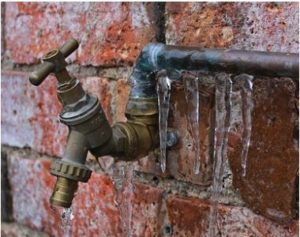
Preventing your pipes from freezing in the winter should be a high-priority goal of every homeowner. It only takes a few minutes to take some basic precautions, so many cases of frozen pipes may be preventable! In this week’s blog, let’s take a look at the answer to how do pipes freeze, as well as some important tips for preventing frozen pipes in the first place.
How Do Pipes Freeze?
Pipes can freeze when the temperature drops below 32 degrees. The danger is greater for pipes that are outdoors, and for pipes that are near outside walls or in cold locations in your home. Any pipes can freeze, but especially less insulated pipes that are exposed to lower temperatures. When the temperature drops below freezing, water flowing through these pipes can turn into ice, blocking the pipes and potentially causing the pipes to burst under pressure.
How to Prevent Frozen Pipes
Follow these tips to prevent your indoor pipes from freezing this winter:
- Set the thermostat in your home to a safe minimum temperature, typically around 60 degrees, when the weather is very cold. Going on vacation during the winter? Make sure to leave the heat on so that you don’t come home to frozen pipes.
- Keep the garage door closed as much as possible, especially if the garage has any water supply lines in it.
- Open cabinet doors under the bathroom and kitchen sinks when the temperatures drop into the teens.
- Turn faucets on and let cold water drip slowly to keep water flowing through the pipes.
- Insulate! Add or replace old insulation in the attic, garage, basement, and crawl spaces. Fill cracks along windows and doors with caulk to prevent drafts. Use pipe insulator to insulate the pipes themselves. Ask your plumbing professional for advice about insulating your pipes!
Take care of outdoor pipes, such pipes connected to garden hoses, before temperatures drop. Turn off the water to these pipes and let any remaining water drain out before the temperatures drop. Leave them like this until the spring. This will prevent these pipes from freezing.
Thawing Frozen Pipes
Do you already have a frozen pipe? Water expands when it freezes, so the pressure can cause pipes to crack and burst. You definitely want to address frozen pipes before this happens, since water damage can be very costly!
If you discover a frozen pipe, shut off the water supply to at least that section of plumbing. You may be able to thaw the pipe using a space heater, heating pad, or hair dryer. Wrap the pipe with the heating pad or blast it with warm hair from the hair dryer.
Need Help Preventing Frozen Pipes This Winter? Call Us for an Appointment
Do you need assistance preventing frozen pipes? Schedule an appointment for service with Solution Based Plumbing, Heating, and A/C by calling the office at 215-584-2098 or completing the contact form on our website. We look forward to meeting you!
